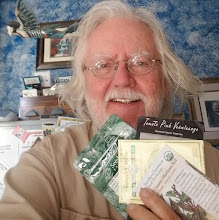 |
| The diversity of F1 Two Mary Corn |
Years ago, when I first started teaching plant propagation for UCLA Extension, I bought a book called, Breed Your Own Vegetables by Carol Deppe. It proved a bit daunting and I put it down. I didn't care for the lessons in Mendelian genetics. I had taught Mendelian genetics before in a general botany class and, though I understood it, it wasn't my cup of tea and so I put Deppe's book down and it collected dust on my shelf.
Last year, with the seed library idea singing it's siren song in my ear, I pulled the book off the shelf again because of it's full title, Breed Your Own Vegetable Varieties: The Gardener's & Farmer's Guide to Plant Breeding & Seed Saving (this is probably about the tenth time I've written about this book in one of my blogs, you get the idea that my copy is well worn!) I pulled the book off the shelf and was immediately impressed with Deppe's writing, filled with warm and engaging descriptions of the seeds and stories she told that illustrated her points. After getting through the seed saving half of the book, I began to stick a toe filled with trepidation in the breeding half.
As I studied seed saving, it was obvious to me that a seed saver is already a defacto plant breeder: It may not be an overtly dedicated breeding program, but simply by saving the seed from plant A (it was taller and had more fruit) instead of plant B, one has bred in favor of the genetic make up of plant A vs. plant B. So all seed savers are plant breeders, even if only 'passive' plant breeders.
After my week long immersion in seed school, I am convinced more than ever that breeding plants for organic food production has got to be the next frontier for me and I hope I can convince a lot more folks to join me. I mean the active kind of plant breeding – the kind that starts at the beginning of the growing season with intention to create a new variety and goes through season after season to achieve the goal of a new variety.
 |
| Two Mary Corn |
A couple of years ago, we had two Mary's volunteering at
The Learning Garden. They met there and became roommates for a time – both were good solid gardeners. One year, they started seeds of corn and after the corn had germinated, found they needed to move and had no place to plant it. They gave about forty growing corn plants to me. I grew them out and the diversity was astounding (first picture, above). I saved that seed, but I was intimidated about breeding corn and never took it forward. Now, I know what to do and I am eager to pull that seed out again and begin to breed it out to be true. That is project number one. It is only to breed out some of the more beautiful corn seeds for a gorgeous corn. The picture of one of the ears can be seen as a heading (
L A Garden Blog) or back drop (
Record of The Seed Library of Los Angeles) on two blogs I help author. The working name for this corn is Two Mary Corn. Still looking for a good name, but that'll do for my notes.
 |
| 'Purple Maize'' |
The one that has totally captured my imagination has a working name of Purple Maize. Sorry, I can't help it. If I am successful, don't worry, it will not be released as 'Purple Maize.' I'll find another name for it before then. This is a corn from the collection of
Native Seed/SEARCH, unfortunately an unmarked ear, that is a purple colored dent corn. Dent corn is a combination between a flour corn and a flint corn. I just learned the difference this last week at Seed School. Flour corns are softer and are preferred as the source for flour. Flint corns are harder and can be used like flour corns but they are harder to grind and are therefore not the first choice. However, that hardness insures that they will keep better so most folks dealing with subsistence agriculture were inclined to grow both.
The two come together in a 'dent' corn. A dent corn has the interior of a flour corn with the exterior of a flint. The two dry differently with the flour giving up more moisture than the flint causing the kernel to have a 'dent,' a rather pr0nounced dimple, at the top of the kernel. They have a reputation for being highly productive corns – in fact, from the 1890's to the 1920's, THE corn American farmers grew was Reid's Dent, a charming story I'll write down one day soon. Reid's Dent was superseded by the beginning of the hybrid era which continues through today. This corn, collected from the Native American gardens of America's south west is most assuredly a drought tolerant corn and only a chance cross between a flour and flint corn, in other words, not a stable cross and the resulting seeds are as likely to be a flour or flint as well as a dent.
There is no listing for a purple dent corn in the Native Seed/SEARCH database, but here was this one ear. Purple can be equated with higher levels of anthocyanins. If one could breed a corn that was high in
anthocyanins, stored well and produced abundantly, one might have a hit on his hands. Or, in the words of the Tucson gardening community, spoken with a tongue firmly in cheek, “Rich, Rich, Rich! It's going to make us Rich, Rich, Rich!” Of course, nothing in plant breeding does these days and I would be happy enough to breed a useful plant that helps us actually assuage hunger rather than sell more herbicides.
Corn breeding is harder than tomato or pepper breeding, because corn cannot be inbred too much before one gets a very negative feedback from the corn in weak and unproductive plants. I am starting with only a few seeds, so the first year is to grow out enough seeds to begin to experiment – of course, I will only select to plant corn seed that continues to exhibit the purple dent characteristics. It is important to note that I will need 200 or more plants in the second year in order to not experience the negative effects of inbreeding. The good news is that the plants can be located in different gardens. So, I'll be looking around for places I can plant something like forty plants in to achieve my 200 plant minimum.
But we need more plants being bred – we need plants that can survive drought, hotter temperatures (many pollens die at higher temperatures, we need to find look for pollen with more tolerance to heat), plants that remain upright despite harsher storms. All these are likely scenarios in the coming decades because of global climate change. These are plants that will produce the food the world will need in the coming years.
This is the work that will prevent hunger and starvation – not the work of Big Ag and their dependence on oil and patents. If I get a new variety of corn, yes, I WILL patent it. But I'll patent it so it cannot be patented by someone else. I'll give the patent to the Seed Library of Los Angeles or some other philanthropic conscious group.
What would you breed if you had the chance? You probably can do it! And remember, if you fall short, you can still eat the results! I hope you are excited too!
david

















.jpg)